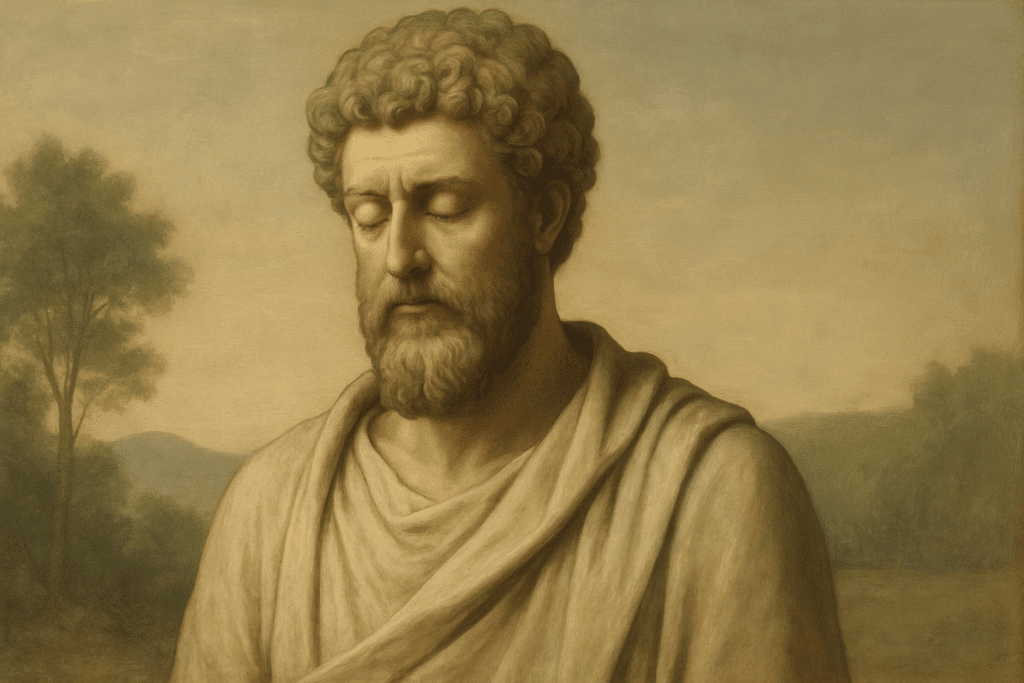Introduction

We’re told to hustle harder. Wake up at 5 AM. Visualize millions. Crush goals.
But what if all of that — the “modern mindset” — is a myth?
Despite all the motivational noise, most people still feel stuck.
Why? Because they’re chasing an illusion, not wisdom.
Long before self-help gurus and dopamine-drenched morning routines, ancient philosophers had already cracked the code to real success. And here’s the wild part: Their version of “winning” life had nothing to do with hustle culture.
In this blog, we’ll break the myth of the modern mindset — and dig deep into how ancient philosophy (Stoicism, Taoism, Vedic wisdom) got it right from the very start.
You’ll walk away with:
- Real, grounded success principles
- Tools that actually calm your mind instead of adding more noise
- A fresh perspective that cuts through the nonsense
By the end, we’ll even drop a few timeless books (Amazon affiliate links included) that can shift your entire lens on life.
This isn’t motivation fluff. This is ancient clarity — reloaded.
The Hustle Lie — Why Modern Success Feels Empty
You’ve seen the mantras:
“Grind now, shine later.”
“Work 18 hours a day.”
“Outwork everyone.”
But here’s the truth no one says out loud — most people who “grind” like that are still miserable.
Modern productivity glorifies burnout.
It teaches you to treat life like a scoreboard, where your value = your output.
It’s dopamine addiction in a suit and tie.
Ancient philosophy saw this coming.
Stoics like Marcus Aurelius warned us:
“It is not that we have a short time to live, but that we waste much of it.”
They believed life wasn’t about doing more, but about doing what matters.
Taoist sages believed in effortless action — what they called wu wei — the art of flowing with life, not forcing it.
The Vedas? They taught that true peace comes from detachment, not achievement.
Meanwhile, modern society tells you to climb a ladder that doesn’t even touch the sky.
So if you’re feeling burnt out, drained, uninspired — maybe it’s not you.
Maybe it’s the myth you’ve been sold.
Why Ancient Philosophy Still Wins

Let’s be real: Ancient thinkers didn’t have smartphones, deadlines, or LinkedIn.
But somehow, their ideas hit harder than half the “motivational gurus” on YouTube today.
Why?
Because they weren’t trying to sell you a course.
They were trying to understand life.
1. Stoicism: Power in Control
Marcus Aurelius didn’t care about hustling harder — he cared about mastering your mind.
Stoicism teaches this golden rule: Focus only on what you can control. Let the rest go.
Imagine the mental peace that comes from truly living that.
2. Vedantic Wisdom: Detach to Succeed
The Bhagavad Gita flips success on its head — “You have a right to your work, but not to the fruits of your work.”
Today’s culture says results = everything.
Vedantic wisdom says: focus on the process, not the prize. Ironically, that’s when the results come.
3. Taoism: Flow Over Force
Modern mindset says “crush it.”
Taoism says: flow with it.
You don’t force rivers — you follow their current.
This philosophy reduces resistance, anxiety, and burnout — the exact opposite of hustle culture.
Ancient wisdom doesn’t just age well — it feels like the truth we forgot.
How Modern Mindset Became a Trap

At first glance, modern mindset advice looks empowering:
“Wake up at 5 AM!”
“Grind now, shine later!”
“Manifest your millions!”
But here’s the truth:
A lot of it is just productivity dressed up as purpose.
1. Hustle Culture Is Just Capitalism in Sneakers
Let’s be honest — much of what we’re told to do is about output, not fulfillment.
You’re not meditating to find peace; you’re meditating to “optimize performance.”
You’re journaling not to reflect — but to hit goals faster.
That’s not growth. That’s glorified burnout.
2. Manifestation Got Hijacked
Real manifestation, as seen in ancient spiritual practices, was about aligning action with intention.
Modern take? Sit still, think positive, and expect a BMW.
It’s not manifestation — it’s magical thinking.
3. You’re Measured by Metrics, Not Meaning
Clicks. Likes. Followers. Monthly income reports.
None of these existed in the ancient world — and yet those people were deeply fulfilled.
Today, you’re “successful” only if your numbers are big enough.
You don’t need more hacks. You need more honesty about what matters.
Real Success According to the Ancients
Ancient philosophies weren’t focused on accumulating wealth or status—they were about cultivating inner peace, balance, and purpose. While modern mindset teachings push us to constantly strive and hustle, the ancients recognized that success came from aligning our inner and outer worlds.
1. Stoicism: Embrace What You Can Control
The Stoics, like Marcus Aurelius and Seneca, taught that real success is found in mastering your response to life’s challenges.
Instead of chasing external validation or wealth, Stoicism focuses on controlling what you can—your thoughts, emotions, and actions—while accepting what you cannot control.
- Key takeaway: It’s not about conquering the world around you, but conquering your internal world.
2. Buddhism: The Path to Inner Peace
Buddhism, especially in its earliest teachings, emphasized the importance of mental peace and clarity. The pursuit of success was not about external achievements but inner contentment.
In a world where we constantly seek more, Buddhism challenges us to embrace simplicity and focus on being present.
- Key takeaway: True success lies in detaching from the material and finding peace in the present moment.
3. Confucianism: Success is in Relationships
Confucius, too, had a radically different view of success. To him, a successful life was not about accumulating wealth or recognition, but about building strong relationships based on trust, loyalty, and respect.
His teachings remind us that success isn’t just individual—it’s relational.
- Key takeaway: The quality of your relationships and your ability to contribute to society determines your success.
Ancient wisdom tells us that success isn’t found in endless hustle or external validation, but in cultivating inner peace, self-discipline, and meaningful connections with others. The more we focus on our inner growth, the more we naturally align with success.
Applying Ancient Wisdom to Modern Life

Understanding and applying the timeless principles of ancient philosophies to our modern lives can be the key to achieving lasting success—not the kind that fades with the next promotion or new possession, but the kind that comes from inner fulfillment and balance.
1. Prioritize Self-Awareness and Reflection (Stoicism & Buddhism)
To make ancient wisdom work in today’s world, start by reflecting on your own thoughts and actions.
- Practice Stoic Journaling: At the end of each day, write down the situations where you felt out of control and explore how you can respond better next time. This practice allows you to stay grounded and focused on things within your control.
- Buddhist Mindfulness: Start your day with a few minutes of meditation. Focus on your breath and be present with each moment. By training your mind to focus, you’ll reduce anxiety, improve productivity, and cultivate a calm clarity throughout your day.
2. Build Meaningful Relationships (Confucianism)
In today’s world, it’s easy to get caught up in our careers or social media personas. Confucius teaches us that the true measure of success lies in the strength and depth of our relationships.
- Nurture Trust: Be genuine, loyal, and respectful in every relationship. Build relationships based on integrity and kindness, and success will follow naturally.
- Community Over Individualism: Focus on contributing to your community and society as a whole. Find ways to give back, whether through work, volunteerism, or simple acts of kindness.
3. Focus on Long-Term Goals, Not Immediate Gratification (Buddhism & Stoicism)
While modern society pushes us towards instant gratification, ancient philosophies encourage us to take the long road and build something that’s sustainable and meaningful.
- Resist the Urge to Overconsume: In a world full of distractions, it’s easy to get caught up in the latest trends, gadgets, or fleeting pleasures. By focusing on long-term goals and cultivating patience, you’ll build a life that reflects true success.
- Practice Self-Discipline: As Stoics taught, success is about mastering your desires. Practice saying “no” to instant pleasures in favor of long-term fulfillment.
4. Simplify Your Life (Buddhism)
Minimalism was long embraced by ancient philosophies, particularly Buddhism.
- Declutter Your Environment: Begin by simplifying your physical space. A tidy, minimalist environment fosters mental clarity and peace.
- Let Go of Excessive Expectations: Stop setting arbitrary, external goals driven by societal pressure. Instead, define success by your personal growth, peace of mind, and the quality of your relationships.
By integrating these ancient principles into your modern lifestyle, you can shift away from the constant chase for fleeting achievements and move toward a more balanced, fulfilling life. True success doesn’t come from accumulating wealth or status—it comes from inner peace, fulfilling relationships, and living in harmony with your values.
Real-Life Examples of Ancient Wisdom in Action
It’s not just about theory—ancient wisdom, when applied correctly, can yield incredible results in the modern world. Let’s look at a few real-life examples where people have embraced timeless philosophies and achieved what many would call ‘true success.’
1. Warren Buffet’s Stoic Influence
Warren Buffet, one of the wealthiest individuals in the world, is known for his approach to long-term investing and the simplicity of his life. While he’s often seen as a modern capitalist, Buffet’s success can be linked to Stoic principles such as patience, self-discipline, and focusing on what he can control.
- Patience Over Quick Gains: Buffet’s mantra of “Don’t look for the needle in the haystack. Just buy the haystack!” reflects the Stoic belief in playing the long game, focusing on consistency and patience rather than seeking instant gratification.
- Emotional Mastery: Just like a Stoic, Buffet often talks about how successful investing involves mastering emotions—specifically fear and greed. He avoids the traps of market speculation by focusing on what truly matters.
2. Tim Ferriss and Buddhist Mindfulness
Tim Ferriss, author of The 4-Hour Workweek, is an advocate for mindfulness and mental clarity. Drawing inspiration from ancient practices like Buddhism, Ferriss incorporates meditation and self-reflection into his daily routine to improve his productivity and mental well-being.
- Daily Meditation: Ferriss attributes much of his success to his commitment to mindfulness and meditation. He believes it helps him make better decisions, reduce stress, and approach life with a more balanced perspective.
- Limiting Distractions: Inspired by Buddhist principles of simplicity, Ferriss has honed the art of focusing on fewer but more important tasks, which allows him to maintain high productivity while avoiding burnout.
3. The Dalai Lama and Compassionate Leadership
The Dalai Lama embodies the wisdom of Buddhism in his approach to leadership. He places empathy and compassion at the center of his leadership style, inspiring millions worldwide.
- Compassion Over Power: Instead of seeking power or dominance, the Dalai Lama believes in leading with compassion, fostering trust, and inspiring others through kindness. This mindset can lead to more loyal followers and a positive, productive environment.
- Mindful Decision-Making: In the Dalai Lama’s leadership, decision-making is guided by awareness and consideration for the well-being of others. This approach not only enhances his influence but also creates harmony in his community.
4. Steve Jobs and Zen Philosophy
Steve Jobs, the co-founder of Apple, was heavily influenced by Zen Buddhism, which emphasizes simplicity, mindfulness, and focus.
- Simplicity in Design: Jobs was known for his obsession with simplicity, often reflecting Zen principles in Apple’s sleek product designs. He sought elegance through minimalism, stripping away unnecessary elements to create intuitive and beautiful products.
- Focus on the Present: Jobs practiced mindfulness in his approach to product development. He was deeply engaged in the present moment and focused on creating something truly meaningful rather than worrying about the future or distractions.
5. Marcus Aurelius’ Influence on Modern Leadership
Marcus Aurelius, one of the greatest Stoic philosophers and Roman emperors, left behind a legacy of leadership grounded in wisdom, resilience, and self-discipline. His personal writings, Meditations, continue to serve as a guide for successful leaders today.
- Resilience in Adversity: Marcus Aurelius faced immense challenges during his reign, from wars to political unrest. Yet he remained calm and focused, drawing on Stoic principles to maintain clarity in the face of adversity. His approach to leadership has inspired countless modern leaders to stay composed during times of stress.
- Focus on Personal Growth: The Stoic principle of self-improvement above all else guided Marcus Aurelius’ rule. By focusing on his own growth and encouraging his subjects to do the same, he created an environment of respect, integrity, and resilience.
These examples demonstrate how ancient philosophies like Stoicism and Buddhism aren’t just theoretical concepts—they can be practically applied to create extraordinary success in modern times. Whether it’s in leadership, investing, or personal growth, these timeless teachings continue to shape the lives of some of the most successful individuals in the world today.
How You Can Start Integrating Ancient Wisdom Today
It’s easy to think that ancient wisdom belongs in the past, but the truth is, these teachings are more relevant now than ever before. You can begin applying these timeless principles to your own life, no matter where you are on your journey. Here’s how you can integrate ancient wisdom into your daily routine to elevate your mindset, productivity, and overall success.
1. Begin with Self-Reflection: The Stoic Practice
One of the most powerful practices you can adopt is self-reflection. Stoic philosophers like Marcus Aurelius spent significant time reflecting on their actions, thoughts, and emotions. This helped them grow and evolve into wiser, more resilient individuals.
- How to Apply It: Take 10-15 minutes each morning or evening to reflect on your thoughts, actions, and decisions. Consider what you could improve and how you can approach challenges with greater wisdom. Journaling can be a great tool for this practice.
2. Cultivate Mindfulness: A Zen Approach
Mindfulness, a core aspect of Zen Buddhism, is about being fully present in each moment, whether you’re working, eating, or interacting with others. This simple practice can help reduce stress, improve concentration, and enhance your overall well-being.
- How to Apply It: Start by setting aside a few minutes each day for mindfulness meditation. Focus on your breath, letting go of distractions, and becoming fully present in the moment. As you grow more accustomed to mindfulness, you can incorporate it into other parts of your day, such as mindful eating or mindful walking.
3. Practice Patience: Embrace the Long Game
Both Stoicism and Buddhism teach the importance of patience and the value of the long-term perspective. In a world that’s obsessed with instant results, embracing patience can help you avoid burnout and maintain a steady pace toward your goals.
- How to Apply It: Rather than expecting quick success, set long-term goals and commit to working toward them day by day. Focus on the process, not just the outcome. Practice delayed gratification, whether it’s resisting the urge to buy unnecessary things or taking the time to master a new skill.
4. Simplify Your Life: A Zen Approach to Minimalism
Both Stoicism and Zen Buddhism emphasize simplicity as a path to greater peace and effectiveness. By stripping away the unnecessary and focusing on what truly matters, you can reduce mental clutter and increase your ability to focus on your goals.
- How to Apply It: Start by decluttering your physical environment. Clear out items that no longer serve you and create a clean, organized space. Then, apply this simplicity to your mental environment. Limit distractions and focus on what’s most important in your life and work.
5. Seek Inner Strength: The Stoic Resilience
The Stoics believed in developing inner strength to face life’s challenges with composure and grace. This mental fortitude is key to overcoming adversity and achieving long-term success.
- How to Apply It: When faced with challenges, instead of reacting impulsively, take a step back and assess the situation calmly. Ask yourself what you can learn from the experience and how you can grow from it. Focus on what you can control and let go of what’s outside of your control.
6. Embrace Compassion: Leadership Inspired by the Dalai Lama
True success is not just about individual achievement—it’s about the impact you have on others. The Dalai Lama teaches that compassionate leadership is the foundation for meaningful influence and lasting success.
- How to Apply It: Whether you’re leading a team or simply interacting with others, lead with compassion and empathy. Listen actively, offer support, and encourage those around you. Practice kindness, not just in your actions but in your thoughts as well.
Small Changes, Big Results
Incorporating ancient wisdom into your daily life doesn’t require dramatic changes—it’s about taking small, intentional steps toward self-improvement. By integrating these timeless teachings, you can build a stronger, more resilient mindset that will help you navigate challenges, increase your productivity, and achieve lasting success.
Conclusion: Why Ancient Wisdom is Your Secret Weapon for Modern Success

As we navigate the fast-paced, achievement-driven world of today, it’s easy to become caught up in modern success myths. But the ancient philosophies that have stood the test of time offer invaluable insights that are still relevant and potent today. From the Stoic resilience that helps us weather any storm to the mindful simplicity of Zen, ancient wisdom provides a framework for living a life full of purpose, balance, and true success.
The lessons from figures like Marcus Aurelius, Buddha, and Laozi remind us that real success isn’t just about external achievements or fleeting pleasure. It’s about cultivating inner peace, developing mental fortitude, and maintaining clarity in our values. These teachings emphasize that success isn’t something you chase—it’s something you build steadily over time, from within.
By integrating the key principles of ancient philosophy into your life, you can shift away from the toxic productivity culture and begin to focus on what really matters. It’s not about doing more; it’s about doing the right things with intention, mindfulness, and patience.
As you embark on this journey of self-discovery and personal growth, remember that success is a deeply individual journey. The ancient wisdom you’ve embraced isn’t just a historical curiosity—it’s a living, breathing guide that can help you navigate the complexities of the modern world. The more you incorporate these timeless teachings into your life, the more you’ll discover your true potential and unlock the success that’s waiting for you.
It’s time to stop chasing the false promises of modern mindset myths and start embracing the wisdom that has been guiding humans toward true fulfillment for centuries.
Amazon Affiliate Books to Explore Ancient Wisdom Further
If you’re ready to dive deeper into the ancient philosophies that can transform your life, here are a few books that can serve as your guide:
- “Meditations” by Marcus Aurelius – A Stoic classic that provides insight into how to live a life of virtue and wisdom.
- “The Tao Te Ching” by Laozi – A profound exploration of Taoism and the concept of “wu wei” (non-action).
- “The Heart of the Buddha’s Teaching” by Thich Nhat Hanh – A comprehensive introduction to Buddhist teachings and mindfulness practices.
- “The Art of War” by Sun Tzu – While originally a military strategy guide, this ancient text offers valuable lessons on leadership and decision-making in modern life.
These books will help you gain a deeper understanding of ancient philosophies and how they can guide you in your quest for true success.
FAQs: Modern Mindset vs. Ancient Philosophy
What is the main difference between modern success culture and ancient philosophy?
Modern success culture often focuses on material achievements, external validation, and relentless productivity. In contrast, ancient philosophies like Stoicism, Taoism, and Buddhism emphasize inner peace, mental clarity, virtue, and living a life aligned with one’s true values.
How can ancient philosophy help me in today’s world?
Ancient philosophy offers timeless wisdom that teaches us how to stay grounded, reduce stress, and build resilience in the face of modern challenges. By adopting principles like mindfulness, virtue ethics, and self-awareness, you can achieve a more balanced, meaningful life—one that goes beyond the pursuit of external success.
Can I still be successful if I embrace ancient philosophy?
Absolutely! Ancient philosophies teach that true success is not just about accumulating wealth or accolades; it’s about living with purpose, integrity, and a sense of fulfillment. By incorporating these teachings into your life, you can find success on your terms, leading to greater satisfaction and long-term well-being.
Which ancient philosophy is best for modern success?
It depends on your personal values and preferences. Stoicism offers practical wisdom for resilience and self-discipline, Taoism focuses on balance and flow, while Buddhism emphasizes mindfulness and detachment. You can incorporate elements from all three to create a holistic approach to modern life.
How can I start incorporating ancient wisdom into my daily routine?
Begin by practicing mindfulness or meditation to cultivate awareness, engage in daily reflection, and make intentional choices that align with your values. You can also read classic texts, such as Meditations by Marcus Aurelius or The Tao Te Ching by Laozi, to deepen your understanding and apply their lessons to your life.
What’s the most practical piece of advice from ancient philosophies?
One of the most practical pieces of advice from Stoicism is the idea of focusing only on what you can control and letting go of what you can’t. This mindset reduces anxiety, enhances productivity, and helps you remain calm in the face of challenges. Similarly, Taoism’s principle of “wu wei” encourages action without force, promoting harmony in all areas of life.
Can ancient philosophies improve my mental health?
Yes! Many ancient philosophies focus on cultivating a calm and clear mind, which can improve mental health. Practices like mindfulness, meditation, and self-reflection can reduce stress, increase emotional resilience, and help you better manage negative thoughts and emotions.
Where can I learn more about these ancient philosophies?
You can start with classic texts like Meditations by Marcus Aurelius (Stoicism), The Tao Te Ching by Laozi (Taoism), or The Heart of the Buddha’s Teaching by Thich Nhat Hanh (Buddhism). There are also modern interpretations and teachings that make these philosophies more accessible for everyday life.
